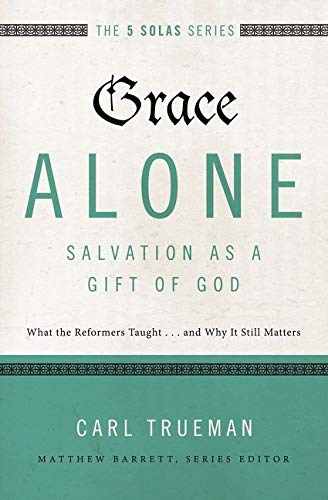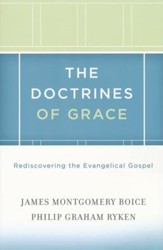Quotes about Salvation-Grace_Alone
Grace burst forth spontaneously from the bosom of eternal love and rested not until it had removed every impediment and found its way to the sinner’s side, swelling round him in full flow. Grace does away the distance between the sinner and God, which sin had created. Grace meets the sinner on the spot where he stands; grace approaches him just as he is. Grace does not wait till there is something to attract it nor till a good reason is found in the sinner for its flowing to him… It was free, sovereign grace when it first thought of the sinner; it was free grace when it found and laid hold of him; and it is free grace when it hands him up into glory.
There can be no grace when there is no sovereignty. Deny God’s right to choose whom He will and you deny His right to save whom He will. Deny His right to save whom He will and you deny that salvation is of grace. If salvation is made to hinge upon any merit or fitness in man, seen or foreseen, grace is at an end.
Divine grace disdains to be assisted in the performance of that work which peculiarly belongs to itself, by the poor, imperfect performances of men. Attempts to complete what grace begins, betray our pride and offend the Lord; but cannot promote spiritual interest. Let the reader, therefore, carefully remember, that grace is either absolutely free, or it is not at all: and, that he who professes to look for salvation by grace, either believes in his heart to be saved entirely by it, or he acts inconsistently in affairs of the greatest importance.
Grace stands in direct opposition to any supposed worthiness on our part. To say it another way: Grace and works are mutually exclusive. As Paul said in Romans 11:6, “And if by grace, then it is no longer by works; if it were, grace would no longer be grace.” Our relationship with God is based on either works or grace. There is never a works-plus-grace relationship with Him.
Transforming Grace, NavPress, 1991, p. 22. Used by permission of NavPress – www.navpress.com. All rights reserved. Get this book!
The supreme purpose of God is to be realized through the salvation of men by grace alone. So fully does that supreme purpose now dominate the divine undertakings in the universe that everything in heaven and in the earth is contributing solely to the one end. To gain the realization of this supreme purpose, this age, which continues from the death of Christ to His coming again, was ushered in. These long centuries of human struggle were decreed for this one purpose. No vision which is less than this will prove sufficient. Men with blinded eyes do not see afar off. To such, the world is moving on by mere chance, or to the supposed consummation of some human glory in the earth. Eyes thus blinded see nothing of the glory of heaven; minds thus darkened understand nothing of the supreme purpose of God in the demonstration of the exceeding riches of His grace. But when this age is consummated, it will be clearly seen by all beings in heaven and in the earth that these centuries of the on-moving universe have been designed for no other reason than the realization of the supreme purpose of God in the salvation of men by grace alone.
Grace…means the full and free forgiveness of every sin, without God demanding or expecting anything from the one so forgiven – is a principle so opposed to all man’s thoughts and ways, so far above man, that he dislikes it. His own heart often secretly calls it injustice. He does not deal in this way and he does not like to think of God doing so.
It is not only by grace alone that we become God’s people but by grace alone we remain His people.
It is the grace of God that fallen men most detest. If lost men really thought that God is a harsh and cruel deity who deals severely with all who offend Him, they would cower in His presence, and they would do everything possible to avoid His wrath. Men do not fear God, however; they disdain Him. They interpret His grace as weakness and His delay of judgment as inability to achieve His purposes. Men who are sinners do not want to admit their own guilt and thus do not want to petition God for grace. They will have heaven on their own terms or not at all. Thus lost men will go to hell because they hate grace and will have none of it.
The Grace of God, Part I – Ephesians 1:5-12; 2:1-10, www.bible.org, Copyright ©1996-2005, All rights reserved.
I have taken all of my bad deeds and put them on a heap, and I have taken my good deeds as well, and I have put them on the same heap. And I have run away from that heap into the arms of Jesus. I die in peace.
The American brand of cultural Christianity results from well-intending adults handing out the candy of cheap grace to five-year-olds and twenty-five-year-olds alike. You ask them if they want to be with mommy and daddy in heaven or pressure them into walking an aisle. The point is, you play on their fears, emotions, or appetites to get quick, unconsidered professions of faith. Then you immediately affirm those professions.
Must Membership Look the Same Everywhere? by Jonathan Leeman taken from Church Membership by Jonathan Leeman, copyright (2012), Crossway Books, a division of Good News Publishers, Wheaton Illinois 60187, www.crosswaybooks.org, p. 122.
If any man ascribes anything of salvation, even the very least thing, to the free will of man, he know nothing of grace, and he has not learned Jesus Christ rightly.
For almost twenty years and I still feel the old clinging dirt of wanting to deal with God that I may contribute something, so that He will have to give me His grace in exchange for my holiness. And still I cannot get into my head that I should surrender myself completely to sheer grace.
Anything added to grace destroys it just as surely as does anything taken from it. When law – even God’s own law – is added to grace, His grace ceases to be grace.
There are only two ways that you can believe you can come to God; either on the merits of Christ or on your own merits. It’s either by grace and grace alone or it’s by works or some mixture of grace and works. It’s only two things. There’s only two kinds of religion in the world. The religion of divine accomplishment, the religion of human achievement, Christianity, the true gospel is the religion of divine accomplishment: God does it all, you simply believe. Every other religious system in the world is a religion of human achievement.
Christ Creates Conflict in the Synagogue. The sermon originally appeared (https://www.gty.org/library/sermons-library/42-182/christ-creates-conflict-in-the-synagogue) at www.gty.org. © 1969-2008. Grace to You. All rights reserved. Used by Permission.
If God finds incentives for grace within Himself, then nothing in us can disqualify us from His grace – nothing except a proud unwillingness to be loved on terms of grace alone.
Grace is not looking for good men whom it may approve, for it is not grace but mere justice to approve goodness. [Rather] it is looking for condemned, guilty, speechless and helpless men whom it may save, sanctify and glorify.
Why is salvation all of God’s grace and not based in any part on our own works? 1. Because you and I have sin that God will never accept in His holy presence. 2. Because the standard of righteousness required is God Himself. 3. Because, Ephesians 2:9, God does not want us to boast, but rather saves us, “So that in the ages to come He might show the surpassing riches of His grace in kindness toward us in Christ Jesus” (Ephesians 2:7). 4. Because a love relationship is never based on the works one gives another. 5. Because we will forever wonder if we did enough good deeds. 6. And because if we could save ourselves based on our works, there would have been no reason to send Jesus Christ.
Is salvation a reward God owes you for your actions or grace that results from His action in Christ? Is salvation payment from on high or is it a gift given to us by God that we did not deserve? Is salvation God praising you for your goodness or is it you praising God for His goodness? What do you believe based on the Scriptures?
What moves God is not our supposed goodness or trophies of righteousness, but rather our desperation and cry to Him for grace. If we could earn it, grace would no longer be grace. Grace by its very definition is giving us what we do not deserve. If we were entitled to God’s favor, it would be a wage that we are due. But since we have merited nothing from God and God being God owes us nothing, we see His favor both in salvation and the blessings that follow all as a token of His undeserved grace to the praise of His glory.
Though every other world religion teaches it, and there are many false churches under the guise of Christianity that are willing to accommodate it, the Bible knows nothing about earning God’s favor. The reason is because we can’t. God is so perfectly holy. He simply can’t accept an ounce of sin in His presence. He’s not looking to bestow eternal life on those who think they are righteous as some sort of a reward. He’s looking for those who acknowledge their own rebellion and look to Him to receive His righteousness as a gift by running to Him for complete rescue.
Maybe we need to realize our sins are more numerous and more offensive to God than we’d like to admit, but at the same time realize His power to forgive, simply on the basis of grace even further exceeds the enormity of our offense. Maybe we are far worse than we ever thought, but He is far more merciful than we ever imagined.
Salvation is achieved either through our work or God’s work. And since salvation is only and entirely a work of God, anything we relied upon for merit actually competes with and cancels out the work of God.
Our only hope for salvation is receiving by grace the righteousness of Christ. He is much too glorious to lower His standard by grading on a curve, rewarding effort or accommodating whatever means we employ in thinking it’s making us acceptable.
Loving a holy God is beyond our moral power. The only kind of God we can love by our sinful nature is an unholy god, an idol made by our own hands. Unless we are born of the Spirit of God, unless God sheds His holy love in our hearts, unless He stoops in His grace to change our hearts, we will not love Him… To love a holy God requires grace, grace strong enough to pierce our hardened hearts and awaken our moribund souls.
Taken from: The Holiness of God, by R.C. Sproul. Copyright © 1990. Used by permission of Tyndale House Publishers, Inc. All rights reserved.
Perhaps the most difficult task for us to perform is to rely on God’s grace and God’s grace alone for our salvation. It is difficult for our pride to rest on grace. Grace is for other people – for beggars. We don’t want to live by a heavenly welfare system. We want to earn our own way and atone for our own sins. We like to think that we will go to heaven because we deserve to be there.
Suffering and Merit? Tabletalk Magazine, Ligonier Ministries, 1989, p. 5. Used by Permission.
Search Scripture through, and you must, if you read it with a candid mind, be persuaded that the doctrine of salvation by grace alone is the great doctrine of the word of God.
If heaven were by merit, it would never be heaven to me, for if I were in it I should say, “I am sure I am here by mistake; I am sure this is not my place; I have no claim to it.” But if it be of grace and not of works, then we may walk into heaven with boldness.
Although God is gracious in His eternal being, He need not be gracious or shower His grace upon anyone. If grace were at any time an obligation of God, it would cease to be grace. God’s grace, therefore, is distinguishing. He graciously saves some but not all, not based on anything present in the creature either possible or actual, foreseen or foreordained, but wholly according to His sovereign good pleasure.
God does not owe this grace to anyone. For what could God owe to one who has nothing to give that can be paid back? Indeed, what could God owe to one who has nothing of his own to give but sin and falsehood?
The Canons of Dort, The Third and Forth Main Points of Doctrine: Human Corruption, Conversion to God, and the Way It Occurs. Article 15- Responses to God’s Grace.
[T]here is nothing in us or done by us at any stage of our earthly development because of which we are acceptable to God. We must always be accepted for Christ’s sake or we cannot ever be accepted at all. This is not true of us only “when we believe,” it is just as true after we have believed. It will continue to be true as long as we live… It is always, on His “blood and righteousness” alone that we can rest. There is never anything that we are or have or do that can take His place or that take a place along with Him. We are always unworthy, and all that we have or do of good is always of pure grace.
What! Get to heaven on your own strength? Why, you might as well try to climb to the moon on a rope of sand!
Recommended Books






















